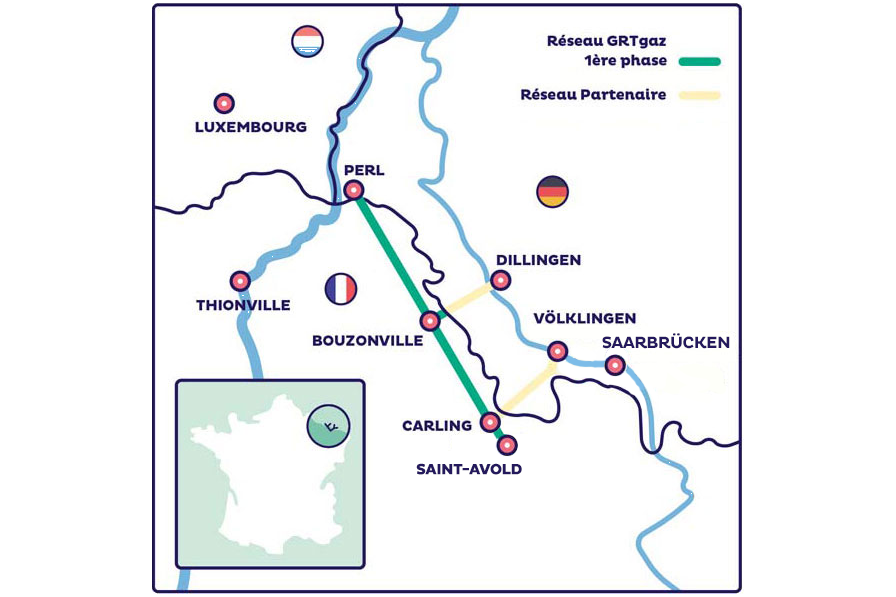mosaHYc – the first cross-border hydrogen transport network between France and Germany

GRTgaz, one of Europe’s leading gas transport operators and Creos Deutschland Wasserstoff GmbH, the hydrogen-focused subsidiary of CREOS Deutschland, a Saarland-based network operator, are to invest €110 million in the construction of mosaHYc – the first open-access hydrogen transport network that will connect France and Germany, thanks to the signing of a contract with the Saarland steelmaking company ROGESA Roheisengesellschaft Saar mbH1, as part of its Power4steel decarbonisation project at the Dillingen site.
An essential contribution to the energy transition and to the development of the local economy
The contract’s signing is a major milestone along the path towards Europe achieving its “Fit for 55” targets. The hydrogen network will also help decarbonise local industry and will enable cross-border mobility by being able to cater to other consumers, including fuel hydrogen distribution stations.
“Together, we are ushering in a new era for the Greater Region:2 steel production is becoming climate neutral and gas networks are being adapted so they can transport hydrogen. We are proud of the major contribution we are making to this transformation with our projects”. said Jonathan Weber, CEO of Stahl-Holding-Saar, Frank Gawantka, CEO of Creos Deutschland, and Sandrine Meunier, CEO of GRTgaz.
Major investments
In total, €110 million have been invested – €40 million from GRTgaz in the Grand Est region, and €70 million from Creos Deutschland Wasserstoff in Saarland.
In France, the R&D component and the project’s innovation are supported by the government within the framework of the ”France 2030” programme, operated by ADEME (French ecological transition agency).
In Germany, the way in which mosaHYc is implemented will be determined by the federal government's IPCEI subsidy decision and by the resulting final investment decision.
This Franco-German infrastructure project has also been recognised by the European Commission as being a Project of Common Interest for the key role it will play in helping Europe to achieve its greenhouse gas emission reduction targets through developing an internal hydrogen market.
Joint start-up of the first cross-border hydrogen valley in the heart of Europe scheduled for 2027
Commissioning of the hydrogen network and the new steel production installations is scheduled for 2027.
The partners will build a 90 km long hydrogen pipeline, 70 km of which will be converted natural gas pipelines. This network will connect up the first industrial consumer – the ROGESA steelmaking factory located in Dillingen – to hydrogen producers along its route, which goes through Völklingen, Saint-Avold, Carling, Bouzonville, Perl (on the Luxembourg border), Saarlouis and Dillingen. The pipeline will transport up to 50,000 tonnes of hydrogen per year to the manufacturer's site. This will be used to feed its new low-carbon steel production process (Power4Steel project).
The mosaHYc network will be further developed: it will enable other hydrogen producers and consumers to be connected up transparently, and in a non-discriminatory way. This network is therefore playing a pioneering role in the construction of the European interior hydrogen market: it is the continent’s first open and shared cross-border infrastructure, foreshadowing implementation of the new gas directive and regulations. It is also integrated into the “Grande Région Hydrogen” a European Economic Interest Group made up of 12 industries seeking to speed up development of hydrogen across the region.
1An SHS group company and common subsidiary of Dillinger (Aktien-Gesellschaft der Dillinger Hüttenwerke) and Saarstahl (Saarstahl AG)
2The Greater Region is an area within which several regions cooperate, including the Lorraine and Saarland regions